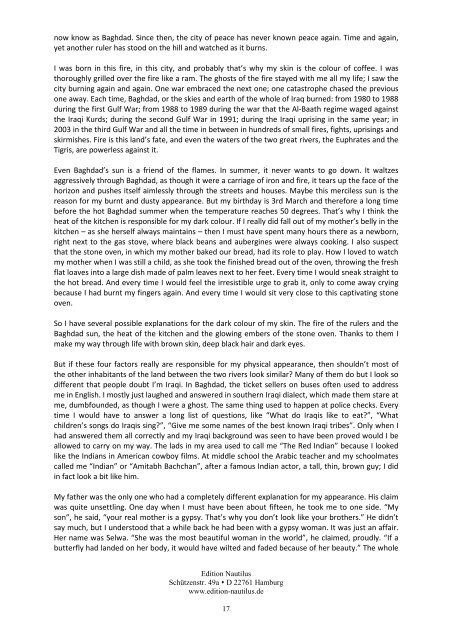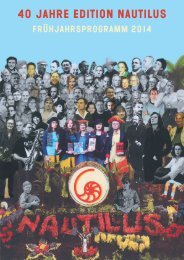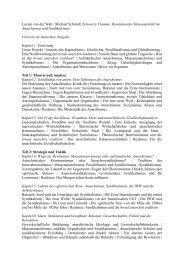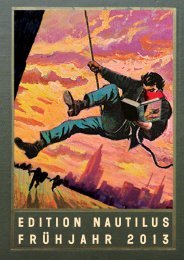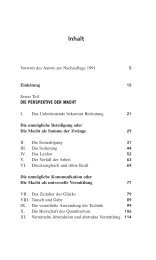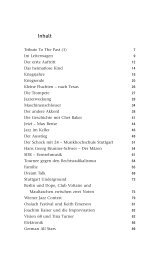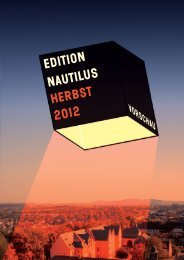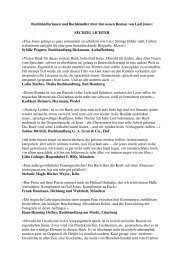Addional information on Abbas Khider
Addional information on Abbas Khider
Addional information on Abbas Khider
You also want an ePaper? Increase the reach of your titles
YUMPU automatically turns print PDFs into web optimized ePapers that Google loves.
now know as Baghdad. Since then, the city of peace has never known peace again. Time and again,<br />
yet another ruler has stood <strong>on</strong> the hill and watched as it burns.<br />
I was born in this fire, in this city, and probably that’s why my skin is the colour of coffee. I was<br />
thoroughly grilled over the fire like a ram. The ghosts of the fire stayed with me all my life; I saw the<br />
city burning again and again. One war embraced the next <strong>on</strong>e; <strong>on</strong>e catastrophe chased the previous<br />
<strong>on</strong>e away. Each time, Baghdad, or the skies and earth of the whole of Iraq burned: from 1980 to 1988<br />
during the first Gulf War; from 1988 to 1989 during the war that the Al-Baath regime waged against<br />
the Iraqi Kurds; during the sec<strong>on</strong>d Gulf War in 1991; during the Iraqi uprising in the same year; in<br />
2003 in the third Gulf War and all the time in between in hundreds of small fires, fights, uprisings and<br />
skirmishes. Fire is this land’s fate, and even the waters of the two great rivers, the Euphrates and the<br />
Tigris, are powerless against it.<br />
Even Baghdad’s sun is a friend of the flames. In summer, it never wants to go down. It waltzes<br />
aggressively through Baghdad, as though it were a carriage of ir<strong>on</strong> and fire, it tears up the face of the<br />
horiz<strong>on</strong> and pushes itself aimlessly through the streets and houses. Maybe this merciless sun is the<br />
reas<strong>on</strong> for my burnt and dusty appearance. But my birthday is 3rd March and therefore a l<strong>on</strong>g time<br />
before the hot Baghdad summer when the temperature reaches 50 degrees. That’s why I think the<br />
heat of the kitchen is resp<strong>on</strong>sible for my dark colour. If I really did fall out of my mother’s belly in the<br />
kitchen – as she herself always maintains – then I must have spent many hours there as a newborn,<br />
right next to the gas stove, where black beans and aubergines were always cooking. I also suspect<br />
that the st<strong>on</strong>e oven, in which my mother baked our bread, had its role to play. How I loved to watch<br />
my mother when I was still a child, as she took the finished bread out of the oven, throwing the fresh<br />
flat loaves into a large dish made of palm leaves next to her feet. Every time I would sneak straight to<br />
the hot bread. And every time I would feel the irresistible urge to grab it, <strong>on</strong>ly to come away crying<br />
because I had burnt my fingers again. And every time I would sit very close to this captivating st<strong>on</strong>e<br />
oven.<br />
So I have several possible explanati<strong>on</strong>s for the dark colour of my skin. The fire of the rulers and the<br />
Baghdad sun, the heat of the kitchen and the glowing embers of the st<strong>on</strong>e oven. Thanks to them I<br />
make my way through life with brown skin, deep black hair and dark eyes.<br />
But if these four factors really are resp<strong>on</strong>sible for my physical appearance, then shouldn’t most of<br />
the other inhabitants of the land between the two rivers look similar? Many of them do but I look so<br />
different that people doubt I’m Iraqi. In Baghdad, the ticket sellers <strong>on</strong> buses often used to address<br />
me in English. I mostly just laughed and answered in southern Iraqi dialect, which made them stare at<br />
me, dumbfounded, as though I were a ghost. The same thing used to happen at police checks. Every<br />
time I would have to answer a l<strong>on</strong>g list of questi<strong>on</strong>s, like “What do Iraqis like to eat?”, “What<br />
children’s s<strong>on</strong>gs do Iraqis sing?”, “Give me some names of the best known Iraqi tribes”. Only when I<br />
had answered them all correctly and my Iraqi background was seen to have been proved would I be<br />
allowed to carry <strong>on</strong> my way. The lads in my area used to call me “The Red Indian” because I looked<br />
like the Indians in American cowboy films. At middle school the Arabic teacher and my schoolmates<br />
called me “Indian” or “Amitabh Bachchan”, after a famous Indian actor, a tall, thin, brown guy; I did<br />
in fact look a bit like him.<br />
My father was the <strong>on</strong>ly <strong>on</strong>e who had a completely different explanati<strong>on</strong> for my appearance. His claim<br />
was quite unsettling. One day when I must have been about fifteen, he took me to <strong>on</strong>e side. “My<br />
s<strong>on</strong>”, he said, “your real mother is a gypsy. That’s why you d<strong>on</strong>’t look like your brothers.” He didn’t<br />
say much, but I understood that a while back he had been with a gypsy woman. It was just an affair.<br />
Her name was Selwa. “She was the most beautiful woman in the world”, he claimed, proudly. “If a<br />
butterfly had landed <strong>on</strong> her body, it would have wilted and faded because of her beauty.” The whole<br />
Editi<strong>on</strong> Nautilus<br />
Schützenstr. 49a � D 22761 Hamburg<br />
www.editi<strong>on</strong>-nautilus.de<br />
17


